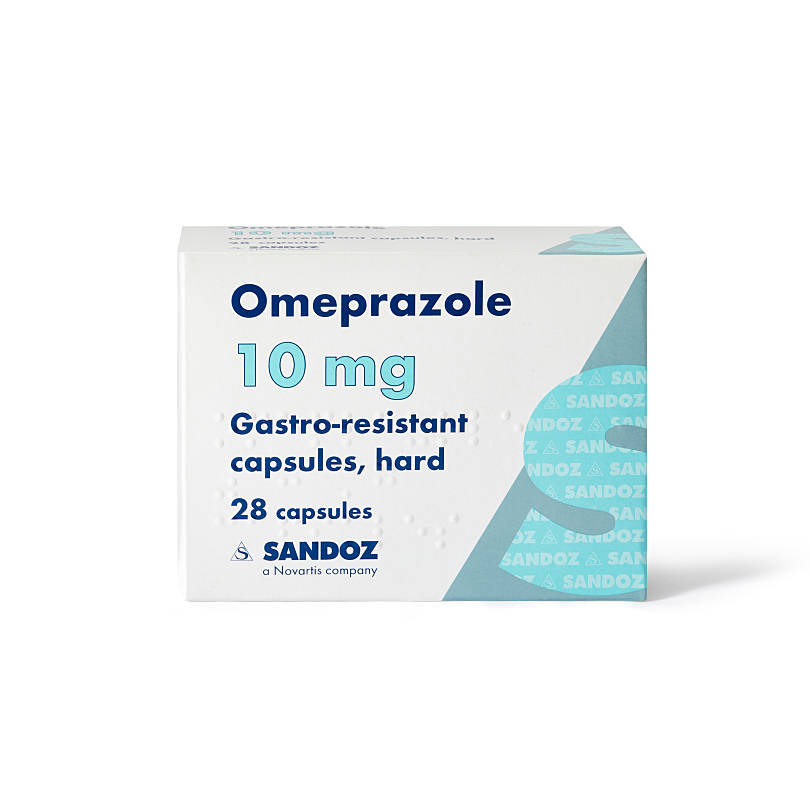Omeprazole
Omeprazole is a medication used to treat heartburn, indigestion, and acid reflux. It does this by reducing the amount of acid in your stomach.














Prices from £14.00
In stock. Simply fill in a brief questionnaire. One of our doctors will review your order and prescribe a suitable treatment. How to Order
-
Omeprazole capsules treat heartburn, indigestion, and acid reflux by reducing the amount of acid in your stomach. They contain the active ingredient omeprazole, which is known as a proton pump inhibitor (PPI). Omeprazole usually comes in 10mg, 20mg, or 40mg capsules.
Prices
28 capsule(s) - £14.00
28 capsule(s) - £15.00
28 capsule(s) - £18.00




About omeprazole
-
-
Omeprazole is a type of medication called a proton pump inhibitor (PPI), and it’s used to treat heartburn, indigestion, and acid reflux. It can also be used to prevent and treat stomach ulcers. It does this by lowering the levels of acid in your stomach by reducing the amount of acid your body makes. This excess acid is what causes the uncomfortable symptoms of acid reflux.
Omeprazole is a generic drug that contains the active ingredient omeprazole. It can sometimes be found under brand names like Pyrocalm, Losec, or Losec MUPS.
Omeprazole vs lansoprazole
Omeprazole and lansoprazole are both PPIs (proton pump inhibitors). This means they work in the same way to reduce acid in your stomach and treat the same conditions, but there are some differences between these treatments. Lansoprazole contains the active ingredient lansoprazole, whereas omeprazole contains the active ingredient, omeprazole.
If omeprazole does not work for you or causes side effects, your doctor may recommend lansoprazole instead. In one study, both medications were found to be as effective, but lansoprazole worked faster to relieve symptoms. You may find one medication works better than the other for your symptoms.
-
-
Omeprazole capsules work by reducing the amount of acid your stomach produces. It does this because it is a proton pump inhibitor. A proton pump is an enzyme in your stomach lining that helps to make acid, which is used to digest food. When you take omeprazole, it stops (inhibits) these proton pumps from working properly. This means your stomach produces less acid, which reduces symptoms associated with heartburn, indigestion, and acid reflux.
Who can take omeprazole?
Most adults can take omeprazole, but you should speak to your doctor if you:
- have problems with your liver
- are waiting to have an endoscopy, as you should stop taking omeprazole a few weeks before
- have ever had an allergic reaction to any PPI
Although omeprazole is an effective treatment, some things can affect how well it works, such as:
- eating foods that make your symptoms worse, such as fatty, greasy, spicy, or rich foods, and acidic foods, such as salad dressings, fizzy drinks, tomatoes, and citrus fruits
- drinking caffeinated drinks like cola, coffee, or tea
- drinking alcohol or smoking
How long does omeprazole take to work?
Omeprazole should start to work within 2 to 3 days of taking it, but you may not experience the full effects of taking this medication for up to 4 weeks. This means you may still have some symptoms during this time. If you are still not getting any benefits from taking omeprazole after this time, you should speak to your doctor, as they may want to recommend an alternative treatment plan.
-
-
Omeprazole is usually prescribed once a day and should be taken first thing in the morning. It is swallowed whole with a glass of water and can be taken with or without food. If you are prescribed omeprazole twice a day, you should take it in the morning and evening.
How often can I take omeprazole?
Omeprazole is usually taken once a day, but this depends on the severity of your symptoms and when you usually get symptoms. You should only take the dose prescribed by your doctor. If your symptoms are not getting better after a few weeks of using omeprazole, speak to your doctor.
How long should I take omeprazole for?
You should take omeprazole for as long as your doctor has prescribed it. It is usually only needed for a few weeks or months to treat most symptoms. Omeprazole can also be taken long term if required. If you feel like you no longer need to take omeprazole, you should speak to your doctor, as they may recommend stopping treatment.
Omeprazole dosage
The usual starting dose for omeprazole is:
- 20mg to 40mg daily for heartburn or acid reflux
- 10mg to 20mg daily for indigestion
- 20mg to 40mg daily for treating or preventing stomach ulcers
However, these doses will vary from person to person, depending on their needs. For example, you may be prescribed a lower dose if you have liver problems.
If you take omeprazole once daily and miss a dose, take it as soon as you remember unless there are less than 12 hours until your next dose. If you take it twice daily, take the missed dose unless there are less than 4 hours until your next dose is due. Never take 2 doses to make up for a missed dose.
-
-
Omeprazole is suitable for most adults, but you may need to speak to your doctor if you have liver problems or have ever had an allergic reaction to omeprazole or another PPI. It should only be taken if you have symptoms of heartburn, indigestion, acid reflux, or a stomach ulcer.
-
-
Common side effects of omeprazole include:
- diarrhoea, stomach pain, wind, or constipation
- headache
- nausea or vomiting (feeling or being sick)
- benign growths (polyps) in the stomach
Most side effects of omeprazole are manageable and go away within a few weeks of taking it. If they do not, speak to your doctor.
Uncommon side effects of omeprazole include:
- trouble sleeping (insomnia)
- swelling of the ankles and feet
- dizziness, tingling in the body like pins and needles, feeling sleepy
- vertigo, a spinning feeling
- skin rash, itchy skin, lumpy rash (hives)
- feeling generally unwell and tired
- an increased risk of fracturing the wrist, hip, or spine
You can find more information on the side effects of omeprazole in the patient information leaflet.
If you notice any serious side effects, you must call your doctor or 111 straight away. If it is an emergency, call 999.
This includes:
- yellowing of the skin, dark urine (pee), and feeling more tired, these are signs of a liver problem
- severe and continuous diarrhoea, which could be signs of an inflamed bowel
- joint pain with a red skin rash, which is usually on skin exposed to the sun, such as your cheeks, nose, and arms, these are signs of a rare autoimmune disease called subacute cutaneous lupus erythematosus
Are there any long term side effects?
Taking omeprazole for longer than 3 months can cause a drop in the levels of magnesium in your blood. This can cause symptoms such as:
- dizziness
- confusion
- tiredness
- muscle twitches
- shakiness
- irregular heartbeat
Taking omeprazole regularly for longer than a year can increase the chances of some side effects, such as:
- gut infections
- bone fractures
- vitamin B12 deficiency, which can cause symptoms such as a sore and red tongue, feeling very tired, mouth ulcers, and pins and needles
When taking omeprazole for longer than a year, your doctor will carry out regular health checks to make sure it is suitable to keep taking it. If you notice any of these symptoms and are taking omeprazole long term, speak to your doctor straight away.
-
-
Omeprazole can interact with other medications causing it not to work properly or increasing your chances of getting side effects.
You should not take omeprazole if you are also taking any medication containing nelfinavir, which is used to treat HIV. Talk to your doctor if you are taking other medications, especially:
- cilostazol, a medication used to treat peripheral arterial disease (PAD)
- heart medications such as digoxin
- antifungal medications, like ketoconazole
- methotrexate, a medication used to treat rheumatoid arthritis and psoriasis
- phenytoin, a medication used to treat epilepsy
- an antibiotic called rifampicin
- warfarin or clopidogrel, which are medications used to treat or prevent blood clots
- St. Johns wort, a herbal remedy used to treat depression
Omeprazole contains sucrose, which is a type of sugar. If you have an intolerance to some sugars, speak to your doctor before taking omeprazole.
Omeprazole can sometimes cause an allergic reaction. A serious allergic reaction can cause symptoms such as difficulty breathing, dizziness or fainting, swelling in the face, and skin rashes. Call 999 or go to A&E straight away if you get symptoms of a serious allergic reaction.
-
-
There are other PPIs available if omeprazole is not suitable or does not work. These include:
- rabeprazole
- pantoprazole
- lansoprazole
- esomeprazole
Histamine antagonists (also called H2 blockers) also work similarly to omeprazole. These can be used if PPIs are not working for your symptoms or are causing side effects.
There are also other treatments available to treat heartburn and acid reflux, such as:
- antacids, like Gaviscon
- calcium carbonate (Tums)
- sodium carbonate
- Maalox
- Milk of Magnesia
These can relieve heartburn and acid reflux as they neutralise the acid in your stomach.
-
-
When is the best time to take omeprazole?
The best time of day to take omeprazole is first thing in the morning. If you have been prescribed omeprazole twice a day, take your prescribed dose in the morning and the evening.
Can omeprazole make you tired?
There are some side effects of omeprazole that can make you tired. This could also be a sign of a magnesium or vitamin B12 deficiency, especially if you are taking omeprazole long term. If you notice you are feeling more tired than usual, speak to your doctor.
How soon can you drink coffee after taking omeprazole?
You can drink coffee anytime after taking omeprazole, but caffeinated drinks can make your symptoms worse. You may want to limit or avoid coffee if you notice your symptoms are worse after drinking it.
Can you buy omeprazole over the counter?
Yes, you can buy omeprazole over the counter, but it can only be taken for a maximum of 2 weeks. If you still have symptoms, you should speak to your doctor. They may want to do some tests to find the cause of your symptoms or try a different medication.
Can you get omeprazole on the NHS?
Yes, omeprazole is available on the NHS. You will need to make an appointment with your GP so they can discuss your symptoms and make sure omeprazole is the right medication for you.
Can I take omeprazole with other heartburn medication?
You should not take omeprazole with other PPIs like lansoprazole, as this could increase the risk of side effects. You can take omeprazole with antacids, such as Gaviscon, which you can find over the counter or in your local supermarket.

Babak studied medicine at King’s College London and graduated in 2003, having also gained a bachelor’s degree in Physiology during his time there. He completed his general practice (GP) training in East London, where he worked for a number of years as a partner at a large inner-city GP practice. He completed the Royal College of GPs membership exam in 2007.
Meet our doctorsArticle created: 11 Jan 2023
-
Comparison of the effect of lansoprazole and omeprazole on intragastric acidity and gastroesophageal reflux in patients with gastroesophageal reflux disease (1998) PubMed [accessed 07 November 2022]
-
Heartburn and acid reflux (2020) NHS [accessed 07 November 2022]
-
Omeprazole (2021) NHS [accessed 07 November 2022]
-
Omeprazole 20mg Gasto-resistant Capsules (2018) EMC [accessed 07 November 2022]


GMC: 7074021

GMC: 6149061

GMC: 7085115







